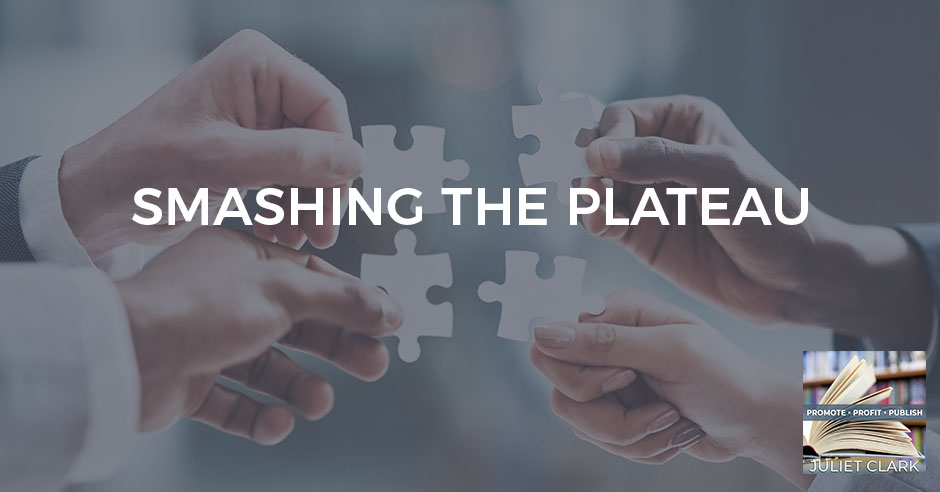
They say no man is an island, and that is applicable even in business. Starting a business is already hard enough without having to go through it alone. So why go through it alone when you can find people who can help you kickstart your idea and realize your dream? In this episode, podcast host and community builder behind Smashing the Plateau, David Shriner-Cahn shares his entrepreneurial community, benefits, and buildings and how it all became necessary to his path to success. Tune in now to learn how you, too, can find the people who can help you make your business dreams to reality!
—
Watch the episode here
Listen to the podcast here
Smashing The Plateau
We have another great guest who is going to be talking about his entrepreneurial community and the benefits of buildings. Before we get started, I want to remind you to go over to YouTube, follow Superbrand Publishing and subscribe so you can get all of these in video. Also, Breakthrough Author Magazine. We have some great contributors that we have added to the queue in 2022.
Jackie Jordan, media booking specialist. Sarah Burke is back. That is exciting. Nina Farid and Robin Stilts are video experts. Starting in February 2023, Tracy Hazzard has joined the magazine team. For those of you who don’t know Tracy, she and her husband, Tom, own Podetize, the biggest podcast post-production house in the world. She is going to be a great resource for podcast guesting and hosting podcasts.
Lastly, I want to remind you that we have some great new courses in 2022. For those of you who are thinking about writing books, we want you to know what you are getting into and developing that reader avatar before you ever get going writing a single word. You need to know whom you are writing for. We have a new course at BuildYourAuthorAvatar.com. It is $97. It will take you about 1 hour or 2 but it is a deep dive into building the avatar and doing the market research that badly needs to be done and most of the time, isn’t. For you who maybe aren’t writing a book but you own a business, this is a big help for your business too.
We put it into the pre-work for our I Love Content Workshop. It was amazing to watch people come to the first course part set up and say, “I did this. I thought my ideal client was X. It turned out to be Y.” It is exciting and reeling down. The more you have that niche down and the more you know, the more you are going to sell, whether it is books, products or services.
Our guest is David Shriner-Cahn. He has a weekly advice program that has been named by Forbes as a Podcast To Power Up Your Ultra-Lean Business. He has also been recognized in The Entrepreneur That Will Change the Way You Communicate by Inc Magazine. He is a podcast host and community builder behind Smashing the Plateau, an online platform offering resources, accountability and comradery to high-performing professionals who are making the leap from a corporate career track into entrepreneurial business ownership.
Starting your own business is hard enough without having to go it alone. Smashing the Plateau is David’s solution to the problems that keep entrepreneurs up at night. He likes to say, “With the help of people like you in our community, you will be able to do more of what you love and get paid what it is worth.” It is such an important concept. David and I get into it a little bit more but transitioning from Corporate America, where that check came in and the steep learning curve to becoming an online entrepreneur is incredible and a community like David’s could help. Stay tuned for David’s interview.
—
David, I’m excited to have you on the show. How are you?
I’m great, Juliet. Thank you for inviting me.
You are welcome. I am excited about your Smashing the Plateau Community because, once upon a time, we were all entrepreneurs and solopreneurs. It is a tough road. It is not the easy thing that everybody thinks it is. Can you talk a little bit about the community, why you built it and hopefully how it can benefit authors?
The short answer is particularly if you start your career in some corporate setting. If you are an inside person in an organization, amid to high-level professional, you have been working for 20 years, sometimes 30 and sometimes 40, you get to a place where your calendar is full every single day. Your inbox is overflowing. You have a built-in social structure. There is a team of people that take care of various functions. You are responsible for yours. You can easily delegate functions to other people and you go out on your own.
In the beginning, you have an empty calendar, inbox and no social structure. Your friends from work are ghosting you. You have no team because you have to do everything and suddenly you are responsible for all these things that you don’t have skills for. On top of everything else, you got to get up, market and sell something that you have never had to sell before, namely yourself. Even if you come out of corporate with a marketing and sales background, it is very different when you are selling a company than selling yourself. It is daunting. You can build your business but you don’t have to build it alone.
You can build your own business, but you don't have to build it alone. Share on XI have experienced this. I was an employee for 28 years. I’ve been an entrepreneur since 2006. I know that I always perform better when I’m interacting with other people in a similar space to me. What I would say is like-minded people that have similarities in their business structure. They are facing similar kinds of challenges. They may have skills I don’t have. I probably have skills they don’t have. We can all build our businesses but we don’t have to build them alone. We can get help from other people like us. That is the whole premise behind the community. I have experienced this and I’m pleased to be able to offer a structure to be able to do this to support other people that are going through a similar experience.
I was a real estate broker in California and I do remember coming off corporate, where I got a check all the time. All of a sudden, if you think about real estate, there is usually a 60 to 90-day wait until you get a check because something on clients around is going to escrow. That wasn’t even the biggest part of it. I have to buy an accounting system and keep track of my expenses and car.
The little thing that we don’t think of when we start a business is I have to keep track of expenses. I have to do it in a responsible way, not a shoebox because the IRS does not like your shoebox. It is an eye-opener, especially when you start hiring people around you too. What are you going to do for human resources? Do you know the laws? Are they going to be in your home? Are they going to be online? That is a lot for entrepreneurs to all of a sudden learn. Marketing is a steep learning curve. Inside your groups, is it one big group or do you break them off into smaller groups so that they are more intensive?
Both. We have the general community. The primary activities include a private online platform in which you log in to communicate with other members. You can communicate one-on-one or one-to-many inside the platform. That is asynchronous communication. We have live events. The live events are synchronous communication, plus we record many of them. If you can’t attend something live and you want to watch the replay, you can.
We also have an accountability program where we match members with a small cohort of other members so that they can meet regularly and work in a structured way on one thing at a time that is going to move their business forward. One of the things that happen when you are in your business is it is overwhelming. There are so many things that you know you need to do. As one person, there is only so much you can do.
There are so many things that you need to do when you’re in business. And as one person, there's only so much you can do. Share on XLet’s say with business development, for example. A great structure is if you are a consultant, a coach, an author or a speaker, your business is primarily going to come from referrals. How do you nurture those referral sources? A good way to do it is to be systematic about it. Let’s say you have 20, 30, to 40 people who are your inner circle. You have a structure where you have some system of reaching out to all those people. That is one touchpoint per quarter with everybody.
If you don’t do this already in a structured way, one thing that could be on your important list for the month is, “I want to set up a structure so that by the end of the month, I will have a system. How I’m going to reach out to my 20, 30 and 40 people over the next 3 months?” If you have this accountability group where you say, “At the beginning of the month, I’m going to spend the next four weeks developing a system where I know it is going to take me less than an hour a week to do the outreach that I need to do. By the end of the month, I want to have the system in place so that every week I know which hour I’m going to spend doing this and how I’m going to do it.”
That is achievable. You tell a group of half a dozen people, “This is what I’m going to do.” You talk about it every week in some way, whether it is through the communication platform or a live conversation. By the end of the month, you are more likely to have your system in place. You will get feedback from other people that may have developed a similar system so you have some shortcuts.
As you are implementing the system in the second month, you can talk with the same people about, “This is what I’m doing. This is how it is going. This is where it is working well. This is where it is not working. Has anybody else done something like this? Do you have any tools you suggest I use?” We do have smaller groups. It is focused on accountability around implementing something important.
I want to focus on the relationships that are being built within the community. When I was on your podcast, we talked about affiliates versus power partners a little bit. What you are building inside of the community is power partners, not the affiliate, where it was like, “Dave, I want you to sell this for me. Here is my landing page. Do a click and I will pay you if somebody buys.” When you are talking about bigger ticket items, these power partners that you are building within that community are your next referral source.
They aren’t always referral sources but they can be. I may not have people in my network that need what you sell or I may not have them now but I may come across them. There are other ways that, in this setting, we can help our colleagues. For example, somebody who is an aspiring author who is working on his first book. You need people that will write reviews when the book comes out and people that will post things on social media about your book to get the word out. That is a relatively easy thing to do.
People are more likely to do it if they have those relationships and they understand what the book is about. Who is the audience for the book? Are there people in my audience that might benefit from knowing about it? A relatively easy thing for me to do is to post something on LinkedIn saying, “Juliet has a new book.” There are people in my audience that might want to get a copy. It would help them.
We use The Power Partnerships for bestseller campaigns all the time but we don’t use affiliates. It is those relationships that we were like, “We have a like-minded business. I love what you are doing here with that working through accountability. Did I find that there was integrity when I worked with the person?” If the answer is yes, I’m going to refer that person to the community a lot. It lines up with my values. I love that you guys are building and being accountable but also there is a relationship component to all of it.
The relationship is the bedrock and we are doing it in a structured way. These kinds of relationships happen naturally but you can also build a structure that will both support it, empower it and enhance it, which is what we have done.

Smashing The Plateau: In business, the relationship is the bedrock and you have to do it in a structured way.
What was the whole genesis behind this? You have been in business for years and this is something you have come up with in 2021.
We launched in January 2022. We officially launched the community. I have done similar things. For example, I have been working with small curated groups of entrepreneurs, primarily solo consultants, coaches and some other types of small businesses. I have seen the same outcomes, which are building a relationship and people becoming tight with one another.
We have people in some of our groups that talk about, “This is my work family.” They will share things, not just business things. When personal things happen, they share them and they get support, a loss of a family member or challenges around trying to have your child apply to college. These kinds of discussions come up. We had one member. I’m trying to help his son get an internship and got some introductions for his son through members of the group. It goes beyond business. It is all about relationships.
I have been working in different ways with the same population and seeing the same outcomes. Honestly, what I have wanted to do for a long time is be able to serve more people. I see this as such a big need. There was an article that I found a couple of years ago. There aren’t many statistics about people in the second half of their careers and what happens with regard to the transition from employment to entrepreneurship but I saw a statistic that if you are over the age of 50 in the US, you have more than a 50% likelihood that you are going to experience job loss and it will have financial consequences.

Smashing The Plateau: If you’re over the age of 50 in the US, you have more than a 50% likelihood that you’re going to experience job loss, and it will have financial consequences.
There is a lot of ageism in the workplace. A 35-year-old is rarely going to hire a 55-year-old. It does happen but it usually happens the other way around. If you are in a place where your role has stagnated and you don’t see a growth opportunity inside the company where you are working now, you are tired of being employed and having somebody else have control over your career destiny. If you want to take charge of your career or you have been pushed out and you want to do your thing, you want to do more of what you love and you have this great experience. If you do great work, you can do much better on your own but you need to be able to build a successful business to support it.
That demographic you are talking about, we work with a lot of those people. There is a steeper learning curve for a lot of them because they probably haven’t been using social media to get themselves out there. It has been more like, “I keep in touch with friends and family.” Versus that 35-year-old who is pretty much coming out of the mom’s womb with an iPhone in his hand. He has been doing that since inception. Even for that demographic, more needs to be learned in regard to marketing and things like that. Nobody jumps in and sets up a funnel, marketing, branding and all of that themselves. Few people have the skillset to be able to do that without support and help.
When you are in the corporate setting, particularly if you have 25-plus years of work experience, your comfort level in developing a personal brand and being public with your personal brand is probably not super high. To survive in the corporate world, you need to tap down your personal brand. As an employee, if you are wrong more than 10% of the time, you are going to hear about it.
As an entrepreneur, developing your personal brand and being successful as an entrepreneur is constantly testing things and failing at them as you figure out what doesn’t work. If you are right more than 10% of the time, you are often doing well. In the corporate setting, you will be uncomfortable and made to feel uncomfortable if you are constantly putting yourself out there.
That is not only true but that personal transition can be a little bit difficult. It wasn’t difficult for me because I went into real estate and you need a personal brand but going from real estate to owning a publishing company, in my mind, I had to be like Simon & Schuster. I had to be a company brand. I spent the first five years hiding behind a corporate brand. When it took off, was when I stepped out and said, “This worked for me when I had a personal brand last time. I better step back into that.” Things took off again. It is hard to know when to step out and when not to step out. For a lot of people, it is scary to step out and be the face.
It took me a long time until I was comfortable being myself and owning my story publicly. It took me years.
Did the podcast do that for you? Did you feel that you were on video all the time and talking? Did that get rid of a lot of that fear?
The funny thing is it helped. It made me more comfortable talking but I was mostly asking questions. I wasn’t revealing a whole lot about myself on the podcast. One of the things is I would get this feedback from people all the time early on as a podcaster. It was like, “David, we want to hear more about you.”
My readers know too much. I’m pretty transparent about it but a lot of my guests are friends and power partners. They already know my family and know the following goals about what is going on with them. Let me ask you this. You were one of the original podcasters. How long have you had yours?
We started in the middle of 2014. It was a long time ago for podcasting.
It started in late 2008, 2009 and 2010. You got in when it started on the upswing.
I have had guests that have been podcasting since 2004 or 2005. The technology several years ago was light years behind where it is in 2022. Honestly, the technology when I started in 2014 was vastly different. Nobody was doing video because the internet couldn’t support video. In the first 4 or 5 years, we would use Skype to record our episodes. Even though Skype had the capability to communicate with video, most people didn’t have the bandwidth for it to work.
I had a podcast back then called Ask Juliet and there was so much more background stuff that had to be done when you use Skype. When you talk about that tech, we used to have teleconferences all the time because we didn’t have that technology. Everything was a teleconference instead of a Zoom event or an in-person event. Wild in that respect. When you put these groups together, do you participate in them? Do you teach? Do you bring experts in or is it all that relationship-building that is done? Do you facilitate?
It is a combination. My style tends to be asking thought-provoking questions, even though I may have some thoughts about the strategies or tactics that somebody is presenting a challenge might be able to implement. My style tends to be asking leading questions to get somebody to decide how they want to approach trying to tackle a challenge.
The community is based on a leader who is often seen almost as a guru teaching the community how to get from point A to point B. This is more about me enabling all of the smart people that are already in the community to help one another, share experiences and ask questions. Get from point A to point B using resources, shortcuts, techniques they may not know about or people sharing experiences they have had that are similar and relate to a challenge that somebody has brought up.

Smashing The Plateau: Asking thought-provoking questions enables all of the smart people to share experiences, ask questions, help one another, get from point A to point B.
We do have formal training. We have members that will offer training. We have outside guests that offer training. Some of it, we structured. That is a training-type event and we record them. We have this growing library of all these resources that people can access in addition to the stuff that happens live. Structured learning is part of it. There is a lot of informal learning that happens as well.
One of the reasons I have my show is there is more than one way to build a platform and it has to be what you are comfortable with. I love that you do it that way because I have worked with those “gurus” before where this is the formula. The formula may have worked for them but I am a different person with a different personality.
I remember my first webinar. It was an absolute crap show. I showed it to another coach who knew me well and said, “Who is that on there? That is not you.” It was because of the format. I love that you do that. That group is cohesive and supportive because there can be different ideas to try. Here is the formula and do it. If it doesn’t work, thank you for the $30,000 you spent to coach with me. I’m moving on. I love that all of that takes place. You have been in this business long enough to know that there are lots of gurus who do that.
I have invested in those courses too. I took a course on how to create a membership community and there are some things that I’m using. There is a lot of stuff that was in that course. It is not me. It also isn’t working for our population.
You and I met at Scott Carson’s. He is a great example of every week is different. He would always present different ways to do things. You could pick up and run with whatever was working for you. I remember talking to you back then and you got this organized way you do your podcast that looks more organized than mine but mine works for me.
As entrepreneurs, there is no one formula and no one size fits all. Your personality, how much inaction you are and how much in nurture you are, all of those things come together. Maybe I will take your idea and modify it a little bit and run with it. I love what you are doing with all this. Where can we find you if we want to talk to you more about joining your community?
Everything that we have is at SmashingThePlateau.com. There is a page for the community with a button to schedule a call with me. That is the easiest way to learn more.
He sends out fantastic emails. I have gotten several and they are always, “How can I help you?” It is never to sell and I love that.
We sprinkle in some sales emails. They are probably too few and far between but mostly value-based.
That is why people buy. Nobody likes that pressure of like, “He is trying to sell me something all the time.” That value is that trust builder where people say, “This is my guy.” It is fabulous that you do that. Thank you so much for being on.
Thank you, Juliet.
Important Links
- Superbrand Publishing
- Breakthrough Author Magazine
- Podetize
- BuildYourAuthorAvatar.com
- The Entrepreneur That Will Change the Way You Communicate
- Smashing the Plateau
- The Power Partnerships
- Ask Juliet – Apple Podcasts
About David Shriner-Cahn
 David Shriner-Cahn’s weekly advice program has been named by Forbes as a Podcast To Power Up Your Ultra-Lean Business. David has also been recognized as an Entrepreneur That Will Change The Way You Communicate by Inc. Magazine. David is the podcast host and community builder behind Smashing The Plateau, an online platform offering resources, accountability, and camaraderie to high-performing professionals who are making the leap from the corporate career track to entrepreneurial business ownership. Starting your own business is hard enough without having to go it alone. Smashing The Plateau is David’s solution to the problems that keep entrepreneurs up at night. As he likes to say, “With the help of people just like you in our community, you’ll be able to do more of what you love and get paid what you’re worth.”
David Shriner-Cahn’s weekly advice program has been named by Forbes as a Podcast To Power Up Your Ultra-Lean Business. David has also been recognized as an Entrepreneur That Will Change The Way You Communicate by Inc. Magazine. David is the podcast host and community builder behind Smashing The Plateau, an online platform offering resources, accountability, and camaraderie to high-performing professionals who are making the leap from the corporate career track to entrepreneurial business ownership. Starting your own business is hard enough without having to go it alone. Smashing The Plateau is David’s solution to the problems that keep entrepreneurs up at night. As he likes to say, “With the help of people just like you in our community, you’ll be able to do more of what you love and get paid what you’re worth.”
Love the show? Subscribe, rate, review, and share!
- superbrandpublishing.com
- Promote, Profit, Publish on YouTube
- Follow Juliet on LinkedIn
- Take the Quiz!









Leave A Comment